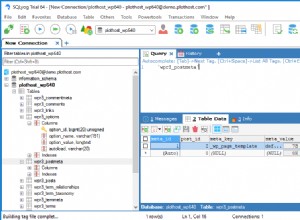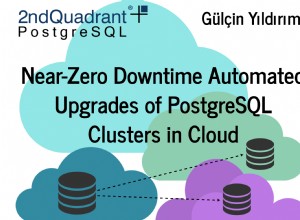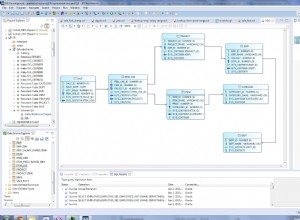Em primeiro lugar, não use
OleDb , período. A Microsoft diz para você usar o provedor específico do fornecedor. Use o ODP.NET da Oracle. Segundo, para recuperar o conjunto de registros do Oracle SP, você precisa retornar
refCursor . Editar: Neste momento, sabemos que seus parâmetros são tabelas. Para processar isso, você precisa adicionar
p.CollectionType = OracleCollectionType.PLSQLAssociativeArray aos seus parâmetros Seu código é basicamente isso:
Declare
obus_grp_id PKG_HOBS.Tnumber; -- numeric table value
ostat_c PKG_HOBS.Tnumber; -- numeric table value
ostat_msg_x PKG_HOBS.Tmsg_500; -- string table value
BEGIN
PKG_HOBS.PRC_HOBS_GET_CLIENTID(obus_grp_id, ostat_c, ostat_msg_x);
END;
Eu vejo você executando o bloqueio anônimo - você não precisa fazer isso, pois isso complica as coisas para você. O que você precisa fazer é usar vb.net para executar o pacote diretamente.
Resumo: seu código ORACLE atual não faz nada para gerar resultados em .NET. Remova o bloqueio anônimo e você está no negócio.
Aqui está o código para processar seu tipo de procedimento (leia nos comentários)
Dim cmd As New OracleCommand("PKG_HOBS.PRC_HOBS_GET_CLIENTID", conn)
cmd.CommandType = CommandType.StoredProcedure
Dim p1 As New OracleParameter(":p1", OracleDbType.Int64, ParameterDirection.Output)
p1.CollectionType = OracleCollectionType.PLSQLAssociativeArray
p1.Size = 100 ' Declare more than you expect
' This line below is not needed for numeric types (date too???)
' p1.ArrayBindSize = New Integer(99) {}
cmd.Parameters.Add(p1)
' Add parameter 2 here - same as 1
Dim p3 As New OracleParameter(":p3", OracleDbType.Varchar2, ParameterDirection.Output)
p3.CollectionType = OracleCollectionType.PLSQLAssociativeArray
p3.Size = 100 ' Declare more than you expect
' for string data types you need to allocate space for each element
p3.ArrayBindSize = Enumerable.Repeat(500, 100).ToArray() ' get 100 elements of 500 - size of returning string
' I don't know why you have problems referencing System.Linq but if you do...
'Dim intA() As Integer = New Integer(99) {}
'For i as integer = 0 to intA.Length -1
' intA(i) = 500
'Next
cmd.Parameters.Add(p3)
conn.Open()
cmd.ExecuteNonQuery()
' Ora number is not compatible to .net types. for example integer is something
' between number(9) and (10). So, if number(10) is the type - you get Long in
' return. Therefore use "Convert"
' Also, you return arrays, so you need to process them as arrays - NOTE CHANGES
Dim oraNumbers() As OracleDecimal = CType(p1.Value, OracleDecimal())
Dim myP1Values(oraNumbers.Length - 1) As Long
For i as Integer = 0 To oraNumbers.Length - 1
myP1Values(i) = Convert.ToInt64(oraNumbers(i).Value)
Next
oraNumbers = CType(p2.Value, OracleDecimal())
Dim myP2Values(oraNumbers.Length - 1) As Long
For i as Integer = 0 To oraNumbers.Length - 1
myP2Values(i) = Convert.ToInt64(oraNumbers(i).Value)
Next
Dim oraStrings() As OracleString= CType(p3.Value, OracleString())
Dim myP3Values(oraStrings.Length - 1) As String
For i as Integer = 0 To oraStrings.Length - 1
myP3Values(i) = oraStrings(i).Value
Next
E esta é a parte mais importante
A parte mais importante é como você preenche seu tipo declarado. Vamos levar
TYPE Tnumber IS TABLE OF NUMBER INDEX BY BINARY_INTEGER;
v_num Tnumber;
v_num(1) := 1234567890;
v_num(2) := 2345678901;
v_num(3) := 3456789012;
Isso (acima) funcionará. Mas isso vai falhar:
v_num(0) := 1234567890;
v_num(1) := 2345678901;
v_num(2) := 3456789012;
E finalmente, isso funcionará com uma condição
v_num(2) := 1234567890;
v_num(3) := 2345678901;
v_num(4) := 3456789012;
Aqui teremos 4 membros em
p1.Value mas sob o índice 0 você terá oracle null . Então, você precisaria lidar com isso aqui (se você tiver essa condição) ' instead of this
myP2Values(i) = Convert.ToInt64(oraNumbers(i).Value)
' you will need first to check
If oraNumbers(i).IsNull Then
. . . .
Então, o principal aqui é:QUAL é o índice da sua tabela pl/sql?! Ele precisa começar de algo maior que
0 , e de preferência de 1 . E se você tiver um índice com números ignorados, ou seja, 2,4,6,8 , todos esses espaços farão parte do array oracle de retorno e haverá oracle null neles Aqui está alguma referência




